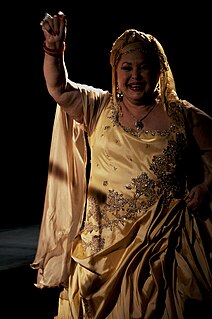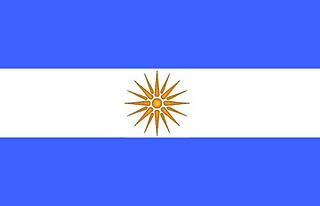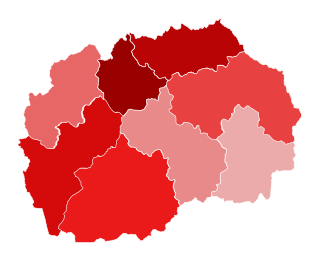
Skopje is the capital and largest city of North Macedonia. It is the country's political, cultural, economic, and academic centre.

Macedonians are a nation and a South Slavic ethnic group native to the region of Macedonia in Southeast Europe. They speak Macedonian, a South Slavic language. About two-thirds of all ethnic Macedonians live in North Macedonia and there are also communities in a number of other countries.
Macedonian Australians are Australian citizens of Macedonian descent. Many arrived in the 1920s and 1930s, although larger numbers came to Australia after World War II and the Greek Civil War. By far the largest wave of immigration was during the 1960s and 1970s.

Esma Redžepova-Teodosievska was a Macedonian Romani vocalist, songwriter and humanitarian. Because of her prolific repertoire, which included hundreds of songs, and because of her contribution to Roma culture and its promotion, she was nicknamed Queen of the Gypsies.

Macedonian nationalism is a general grouping of nationalist ideas and concepts among ethnic Macedonians that were first formed in the late 19th century among separatists seeking the autonomy of the region of Macedonia from the Ottoman Empire. The idea evolved during the early 20th century alongside the first expressions of ethnic nationalism among the Slavs of Macedonia. The separate Macedonian nation gained recognition after World War II when the "Socialist Republic of Macedonia" was created as part of Yugoslavia. Afterwards the Macedonian historiography has established historical links between the ethnic Macedonians and events and Bulgarian figures from the Middle Ages up to the 20th century. Following the independence of the Republic of Macedonia in the late 20th century, issues of Macedonian national identity have become contested by the country's neighbours, as some adherents to aggressive Macedonian nationalism, called Macedonism, hold more extreme beliefs such as an unbroken continuity between ancient Macedonians, and modern ethnic Macedonians, and views connected to the irredentist concept of a United Macedonia, which involves territorial claims on a large portion of Greece, along with smaller regions of Albania, Bulgaria, Kosovo and Serbia.
Bulgarians are an ethnic minority in North Macedonia. Bulgarians are mostly found in the Strumica area, but over the years, the absolute majority of southeastern North Macedonia have declared themselves Macedonian. The town of Strumica and its surrounding area were part of the Kingdom of Bulgaria between the Balkan wars and the end of World War I, as well as during World War II. The total number of Bulgarians counted in the 2002 Census was 1,417 or roughly 0.07%. Around 90,000 nationals of North Macedonia have received Bulgarian citizenship since 2002, and some 53,000 are still waiting for such. In the period when North Macedonia was part of Yugoslavia, there was also migration of Bulgarians from the so called Western Outlands in Serbia.

The 1963 Skopje earthquake was a 6.1 moment magnitude earthquake which occurred in Skopje, SR Macedonia, then part of the SFR Yugoslavia, on July 26, 1963, which killed over 1,070 people, injured between 3,000 and 4,000 and left more than 200,000 people homeless. About 80 percent of the city was destroyed.
European emigration is the successive emigration waves from the European continent to other continents. The origins of the various European diasporas can be traced to the people who left the European nation states or stateless ethnic communities on the European continent.European population is decreasing at alarming rate in 21th century.

Bukovo is a village in the Bitola municipality approximately three kilometers' distance from the city of Bitola in North Macedonia.

The Macedonian diaspora consists of ethnic Macedonian emigrants and their descendants in countries such as Australia, Italy, the United Kingdom, Germany, New Zealand, Canada, the United States and others. A 1964 estimate put the number of Macedonian emigrants at over 580,000.

Macedonian Canadians are Canadian citizens of ethnic Macedonian descent or Macedonian-born people who reside in Canada. According to the 2016 Census there were 43,110 Canadians who claimed full or partial Macedonian ancestry.

The Macedonian-Australian People's League or MAPL was a procommunist Macedonian Australian political organisation which operated from 1946 to 1957. The organisation had branches open in every major Macedonian settlement in Australia.
The Albanian diaspora are the ethnic Albanians and their descendants living outside of Albania, Kosovo, southeastern Montenegro, western North Macedonia, southeastern Serbia, northwestern Greece and Southern Italy.

A Macedonian Argentine is an Argentine citizen of Macedonian descent or a North Macedonia-born person who resides in Argentina. Most of Macedonian Argentines are descendants of ethnic Macedonians from North Macedonia. Argentina is home to one of the largest Macedonian communities in the Americas. Included are Aromanians and Megleno-Romanians, who became adjusted to Argentine society because of the linguistic similarities between Aromanian, Megleno-Romanian, and Spanish, as well as the Latin identity of Aromanians and Megleno-Romanians.

Macedonians in the United Kingdom refers to people from North Macedonia that have formed communities in or were born in the United Kingdom. The 2011 UK Census recorded a total of 2,983 residents who stated that their country of birth was Macedonia.
The World Macedonian Congress is a self-declared "non-formal parliament of the ethnic Macedonians". It presents itself as an organization fighting and demanding for more human rights to ethnic Macedonians on an international level, but is seen as an ultranationalist organization, supporting the controversial antiquization, by independent researchers and media. It is officially registered as a non-governmental organization based in North Macedonia. The organization was registered during the fall of communism, on 15 September 1990 by Todor Petrov, who is also the president of the organization. Closely related to the World Macedonian Congress are certain Macedonian organizations in the neighboring countries of North Macedonia from whom with larger importance, the Macedonian Party in Albania, the OMO Ilinden in Bulgaria, and the Democratic Party of the Macedonians in Kosovo founded by the organization’s member Ismail Boyda.

Tale Ognenovski was a Macedonian multi-instrumentalist who played clarinet, recorder, tin whistle, bagpipe, zurna, and drums. He composed or arranged 300 instrumental compositions: Macedonian folk dances, jazz compositions, and classical concerts.

Skopje 2014 was a project financed by the Macedonian government of the then-ruling nationalist party VMRO-DPMNE, with the official purpose of giving the capital Skopje a more classical appeal. The project, officially announced in 2010, consisted mainly of the construction of colleges, museums and government buildings, as well as the erection of monuments depicting historical figures from the region of Macedonia. Around 20 buildings and over 40 monuments were to be constructed as part of the project.

Skanderbeg Square is a square in Skopje, North Macedonia.

The COVID-19 pandemic in North Macedonia is part of the ongoing worldwide pandemic of coronavirus disease 2019 caused by severe acute respiratory syndrome coronavirus 2. The virus was confirmed to have reached North Macedonia in February 2020. The initial contagion in the country was mainly connected with the COVID-19 pandemic in Italy as there are circa 70,000 residents of Italy from North Macedonia and resulted in many people returning to North Macedonia, bringing the virus with them. As of 9 July, over 7,000 cases have been confirmed in the country, due to its second wave caused by family reunions during Eid al-Fitr among the Muslim minority and the overall re-opening of the country to organize the parliamentary elections.














